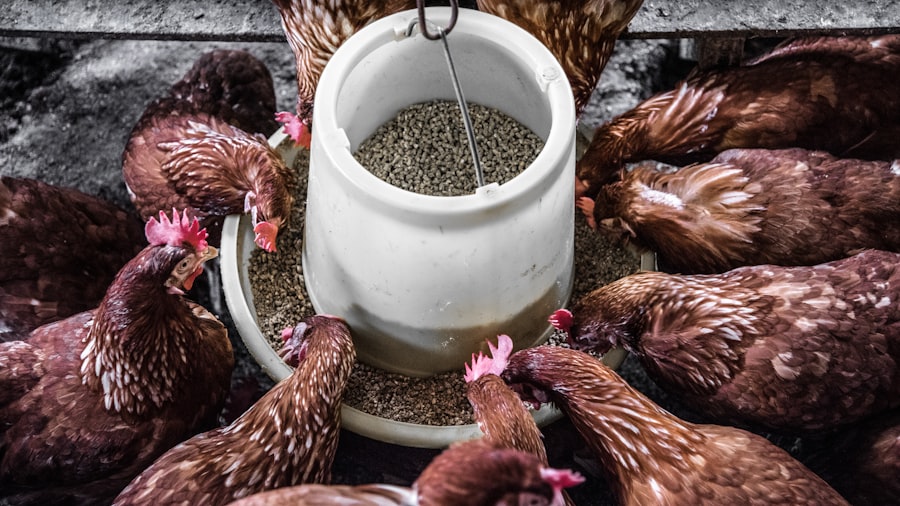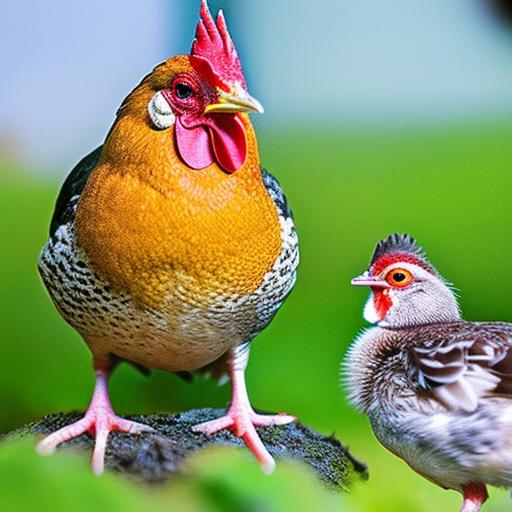Keeping chickens for eggs is a rewarding and fulfilling hobby that has gained popularity in recent years. Not only do you get the benefit of fresh, organic eggs right from your backyard, but you also have the opportunity to connect with nature and experience the joy of raising your own flock. There is something special about waking up in the morning and collecting eggs laid by your own chickens.
I remember when I first started keeping chickens for eggs. It was a decision that I made after doing some research and realizing the numerous benefits of having my own flock. I was tired of buying eggs from the grocery store that were often of questionable quality and taste. I wanted to have control over what my family was consuming, and what better way to do that than by raising my own chickens?
Key Takeaways
- Keeping chickens for eggs is a rewarding and sustainable hobby.
- Choosing the right breed of chicken is important for optimal egg production.
- Building a chicken coop requires careful planning and attention to detail.
- Providing comfortable and clean nesting boxes is crucial for happy hens and healthy eggs.
- Feeding your chickens a balanced diet and keeping them healthy is essential for consistent egg production.
Choosing the Right Breed of Chicken for Egg Production
When it comes to choosing the right breed of chicken for egg production, there are several factors to consider. Different breeds have different egg-laying capabilities, so it’s important to choose a breed that meets your needs.
Some breeds, such as Leghorns and Rhode Island Reds, are known for their high egg production. These breeds can lay up to 300 eggs per year, making them ideal for those who want a steady supply of eggs. Other breeds, like Silkies and Orpingtons, may not lay as many eggs but are known for their friendly personalities and beautiful plumage.
When choosing a breed, it’s also important to consider your climate and the space you have available. Some breeds are more cold-hardy than others, so if you live in a colder climate, you’ll want to choose a breed that can withstand the cold temperatures. Additionally, some breeds require more space than others, so make sure you have enough room in your backyard for your chosen breed.
Building a Chicken Coop: Tips and Tricks
A well-built chicken coop is essential for the health and safety of your flock. It provides shelter from the elements, protection from predators, and a comfortable space for your chickens to lay their eggs.
When building a chicken coop, it’s important to choose the right materials and design. The coop should be sturdy and secure, with walls and a roof that can withstand wind, rain, and snow. It should also have proper ventilation to prevent the buildup of moisture and ammonia.
The size of the coop will depend on the number of chickens you plan to keep. As a general rule of thumb, each chicken should have at least 4 square feet of space inside the coop and 10 square feet of space in the outdoor run. This will ensure that your chickens have enough room to move around and engage in natural behaviors.
Setting Up the Perfect Nesting Boxes for Your Chickens
Nesting boxes are an important part of egg production. They provide a safe and comfortable space for your chickens to lay their eggs, and they also make it easier for you to collect the eggs without disturbing the hens.
When setting up nesting boxes, it’s important to consider size and location. The boxes should be large enough for your hens to comfortably enter and exit, but not so large that they become a cozy spot for multiple hens to lay their eggs at once. A good rule of thumb is to have one nesting box for every 3-4 hens.
The location of the nesting boxes is also important. They should be placed in a quiet and secluded area of the coop, away from high traffic areas. This will help to ensure that your hens feel safe and secure while laying their eggs.
Feeding Your Chickens: What to Feed and How Much
A balanced diet is essential for the health and productivity of your chickens. In addition to providing them with fresh water at all times, you’ll need to feed them a combination of commercial feed, kitchen scraps, and foraged greens.
Commercial feed should make up the majority of your chickens’ diet. Look for a feed that is specifically formulated for laying hens, as it will contain the necessary nutrients to support egg production. You can supplement their diet with kitchen scraps, such as vegetable peels and leftover grains, but be sure to avoid feeding them anything that is toxic or harmful to chickens.
When it comes to how much to feed your chickens, it’s important to provide them with enough food to meet their nutritional needs without overfeeding them. A good rule of thumb is to offer about 1/4 to 1/3 pound of feed per chicken per day. You can adjust this amount based on the size and activity level of your flock.
Keeping Your Chickens Healthy: Preventative Measures and Common Diseases

Keeping your chickens healthy is essential for their overall well-being and egg production. There are several preventative measures you can take to keep your flock healthy and reduce the risk of common diseases.
First and foremost, make sure your chickens have access to clean water at all times. Water is essential for digestion, egg production, and overall health. It’s also important to provide them with a clean and dry living environment. Regularly clean out the coop and replace bedding to prevent the buildup of bacteria and parasites.
Another important preventative measure is to practice good biosecurity. This means limiting contact between your flock and other birds, as well as practicing good hygiene when handling your chickens. Wash your hands before and after handling chickens, and avoid wearing the same shoes or clothing when visiting other poultry farms or areas where wild birds congregate.
Collecting and Storing Fresh Eggs from Your Chickens
Collecting and storing fresh eggs properly is essential for maintaining their quality and freshness. When collecting eggs, it’s important to handle them with care to prevent cracking or breaking the shells.
To collect eggs, simply reach under the hen and gently lift her up to retrieve the eggs from the nesting box. It’s best to collect eggs at least once a day to prevent them from getting dirty or broken. If you notice any cracked or dirty eggs, remove them from the nest and discard them.
When it comes to storing eggs, it’s best to keep them in a cool and dry place. Avoid washing the eggs until you are ready to use them, as this can remove the protective coating on the shell and increase the risk of bacteria entering the egg. Instead, simply wipe off any dirt or debris with a dry cloth before storing.
Cleaning the Chicken Coop: Best Practices and Frequency
Cleaning the chicken coop is an important task that should be done regularly to maintain a healthy living environment for your flock. A clean coop helps to prevent the buildup of bacteria and parasites, which can lead to disease and decreased egg production.
The frequency of cleaning will depend on the size of your flock and the size of your coop. As a general rule of thumb, you should clean out the coop at least once a month. This involves removing all bedding, such as straw or wood shavings, and replacing it with fresh bedding.
In addition to regular cleanings, it’s also important to spot clean the coop on a daily basis. This involves removing any wet or soiled bedding, as well as cleaning out the nesting boxes and roosts. By staying on top of daily maintenance, you can prevent the buildup of waste and keep your coop clean and odor-free.
Winter Care for Your Chickens: Keeping Them Warm and Safe
Winter care is essential for keeping your chickens healthy and comfortable during the cold months. Chickens are generally hardy animals that can withstand cold temperatures, but there are several steps you can take to ensure their well-being.
First and foremost, make sure your chickens have access to fresh water at all times. This can be a challenge in freezing temperatures, so consider using a heated waterer or checking on the water supply multiple times a day to prevent it from freezing.
It’s also important to provide your chickens with a warm and dry living environment. Make sure the coop is well-insulated and free from drafts. You can use straw or wood shavings as bedding to provide extra insulation and warmth. If temperatures drop below freezing, consider using a heat lamp or other supplemental heat source to keep your chickens warm.
Troubleshooting Common Issues with Chicken Egg Production
Despite your best efforts, there may be times when egg production decreases or stops altogether. This can be frustrating, but there are several common issues that can affect egg production and steps you can take to troubleshoot them.
One common issue is stress. Chickens are sensitive animals that can be easily stressed by changes in their environment or routine. If you’ve recently introduced new chickens to the flock, changed their diet, or made any other significant changes, this could be the cause of decreased egg production. Try to minimize stress as much as possible and give your chickens time to adjust.
Another common issue is age. As chickens get older, their egg production naturally decreases. Most hens will lay consistently for the first 2-3 years of their life, but after that, egg production may become less frequent. If you have older hens, it’s important to manage your expectations and understand that they may not lay as many eggs as they once did.
Keeping chickens for eggs is a rewarding and fulfilling hobby that provides numerous benefits. By choosing the right breed, building a well-designed coop, providing proper nutrition and care, and troubleshooting common issues, you can enjoy a steady supply of fresh eggs right from your backyard. So why not start keeping chickens for eggs today? You’ll be amazed at the joy and satisfaction that comes from raising your own flock and enjoying the fruits of their labor.
If you’re interested in learning more about how to keep chickens for eggs, you might find this article on large chicken coop ideas from Poultry Wizard helpful. It provides creative and practical suggestions for designing and building a spacious coop that can accommodate your flock comfortably. Whether you have a small backyard or ample space, this article offers valuable insights and inspiration to ensure your chickens have a safe and comfortable home. Check it out here.
FAQs
What are the benefits of keeping chickens for eggs?
Keeping chickens for eggs can provide a sustainable source of fresh, nutritious eggs. It can also be a fun and educational hobby for families and individuals.
What do chickens need to lay eggs?
Chickens need a balanced diet, access to clean water, and a comfortable and safe living environment to lay eggs. They also require adequate daylight hours and a nesting box to lay their eggs in.
What kind of housing do chickens need?
Chickens need a secure and dry coop that provides protection from predators and the elements. The coop should be well-ventilated and have enough space for the number of chickens being kept.
What should be included in a chicken’s diet?
A chicken’s diet should consist of a balanced feed that includes protein, carbohydrates, vitamins, and minerals. They also enjoy treats such as fruits, vegetables, and grains.
How often do chickens lay eggs?
The frequency of egg-laying depends on the breed of chicken and their age. On average, chickens lay one egg per day, but this can vary.
How do you collect eggs from chickens?
Eggs should be collected daily from the nesting box. It is important to handle the eggs gently and to clean them if necessary.
What are some common health issues for chickens?
Common health issues for chickens include respiratory infections, parasites, and egg-laying problems. It is important to monitor the health of chickens and seek veterinary care if necessary.
Can you keep chickens in an urban area?
Yes, chickens can be kept in urban areas as long as local regulations allow it. It is important to provide a safe and comfortable living environment for the chickens and to be considerate of neighbors.
Meet Walter, the feathered-friend fanatic of Florida! Nestled in the sunshine state, Walter struts through life with his feathered companions, clucking his way to happiness. With a coop that’s fancier than a five-star hotel, he’s the Don Juan of the chicken world. When he’s not teaching his hens to do the cha-cha, you’ll find him in a heated debate with his prized rooster, Sir Clucks-a-Lot. Walter’s poultry passion is no yolk; he’s the sunny-side-up guy you never knew you needed in your flock of friends!







